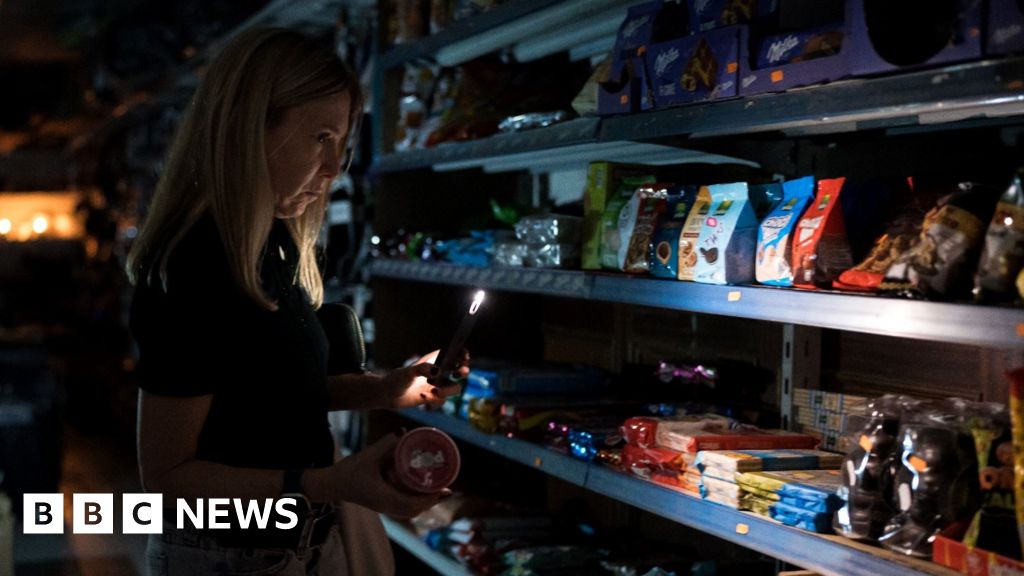The power is out and nothing is working. How am I supposed to get through the day?
That was the question faced by millions of people on Monday across Spain and Portugal during the worst electricity blackout in their history.
We ask people who spent the day without electricity about what helped them get on with life and what outage essentials they were missing.
Cash
Paying with phone and card has become the norm, but in cities across Spain and Portugal, queues formed at cash machines – at least the ones that were still working – as shops switched away from card payments.
“We managed to pay for our coffees with card when the outage first started, [but later] we didn’t have any cash so we couldn’t buy a thing,” Ed Rowe, 26, in Madrid told the BBC.
“All the restaurants that were open were cash only.”
Grace O’Leary, 32, who also lives in Spain’s capital, said she and her mum were counting coins to see if she had enough money to buy wine from a corner shop.
“Cash, apparently, is in fact, king.”
Jaime Giorgio, 28, was lucky enough to have some cash on him, which allowed him to buy food and other essentials.
“In Madrid it was quite chaotic, there was no tube and you couldn’t take out any cash.
“I had cash, but my flatmate didn’t, so I had to lend him money to buy things.”
Radio
The power outage also led to an information blackout, as people spent the day without internet, WhatsApp, calls, and TV.
“The complete loss of communication was the most confusing and concerning thing… we were only left to speculate as to the cause and piece together news from people in the neighbourhood,” said Daniel Clegg from Barcelona.
The 42-year-old said the absence of information led him to looking at the sky to see if planes were still flying.
For Siegfried and Christine Buschschluter, an old windup transistor radio helped tune in to local radio stations to find out what was happening after their phones stopped working and power went off at their rural home outside Spain’s capital.
Christine, 82, explained: “You had to keep on winding and winding.
“It was quite a strange situation. I was born in Berlin during the war and it reminded me of those days when my parents tried to get some news – it took me back.”
The couple reckon the outage will lead to boom in demand for battery-operated radios.
And it is also on Daniel’s shopping list. “Essential kit for back to basics communication and staying informed that I completely neglected to remember.”
Tinned food
Microwaves, air fryers and some hobs and ovens all demand electricity.
But on Monday food that does not require electricity to heat or prepare it were in demand.
In supermarkets, shoppers formed long queues and panic-bought essentials – echoing scenes from the Covid-19 pandemic.
“We bought a lot of food that wasn’t going to go off, like tuna in cans, just in case,” says actor Jaime.
“The outage only lasted a day and now we have so much food, but most of it isn’t going to go bad, as it is easily preserved.”
Lesley Elder, in town Fortuna in south-eastern Spain, said: “Trying to find food you don’t need to heat up, that was more difficult than we thought.
“So we ended up having ham and cheese for dinner.”
She adds a little gas stove to heat up food in a pan would have been helpful.
Candles and torches
Across the Iberian peninsula, people turned to candles to light up dark spaces.
Richard, who lives in the Spanish city of Alcala de Henares, said not a single street light was on when night fell.
“People were finding their way around by torchlight. It was quite surreal seeing the view from my window totally black especially as I live next to a dual carriageway,” he said.
“In my spare time, I make candles and luckily I had a few going spare so I could see in the dark.”
Sarah Baxter, from Barcelona, said she even used a candle stovetop to heat up food.
“We could heat beans and rice, and bring water to a boil for instant potatoes,” she said.
“It was much safer than a propane camping stove inside the apartment.”
Although candles and naked flames can pose a fire risk.
Powerbank
With no power people relied on having battery in their devices.
In Madrid, people queued outside tech shops to get their hands on a power bank.
Luckily for Sarah she had a solar charger that kept her phone charged through ten hours of blackout, and helped her elderly neighbour do the same.
Lesley says her Kindle ran out of battery. “No TV, no Scrabble puzzle on my phone. So having a couple of books would have been helpful,” she said.
But for others, not having access to the internet and their devices was a relief.
“Everyone relies on technology so much that it’s quite a nice reminder you can be more independent,” said Ed.
“You don’t have to be connected with everyone all the time,” said his flatmate Hannah Steiner, 23. “I was having a good time with my flatmates.”
Sara Francisco, 24, from Leiria, in central Portugal, said: “I feel this thing that happened was important to make us be more aware and be more conscious about our habits.”



